Truth About the Warrior Gene Revealed
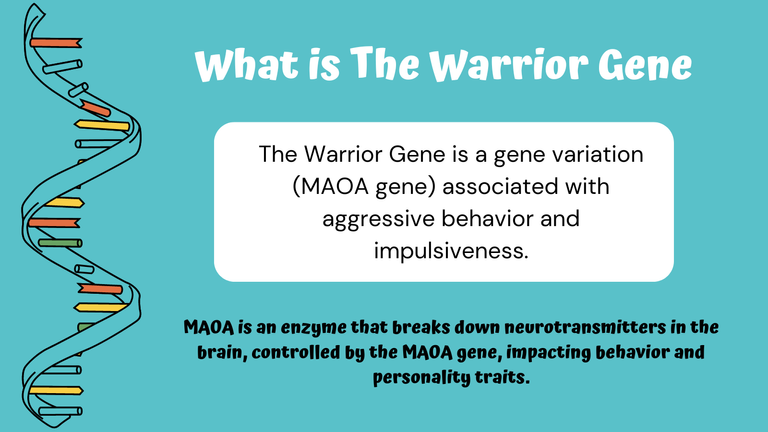
What Exactly is the Warrior Gene?
Are you familiar with the "Warrior Gene"? This gene, formally known as Monoamine Oxidase A (MAOA), plays a significant role in our genetic composition. It influences traits such as personality and behavior by managing mood and impulse control through neurotransmitters like serotonin and dopamine. Different versions of this gene may be associated with aggression, hence its interesting nickname.
A recent study in genetics reveals how the MAOA gene can influence personality traits like extraversion and neuroticism. Dubbed the "Warrior Gene," it affects behavior by producing an enzyme that regulates mood and impulse control neurotransmitters linked to mood and impulse control, like serotonin and dopamine.
Research suggests that variations of this gene may be associated with aggressive behavior, giving rise to its intriguing nickname and making it an interesting topic for studies aimed at understanding the impact of the MAOA gene on human behavior and personality characteristics.
Purpose of the Blog Post
This blog will explore the "Warrior Gene" debate without trying to influence your opinion. We will look at real cases, consult experts like psychologists and geneticists, and analyze data to determine if this gene really predicts aggression or if the studies are misunderstood. Join us as we uncover the truth about the Warrior Gene, its effect on behavior, the science behind it, and how the MAOA gene can shape who we are.
Monoamine Oxidase A Gene (MAOA Gene)
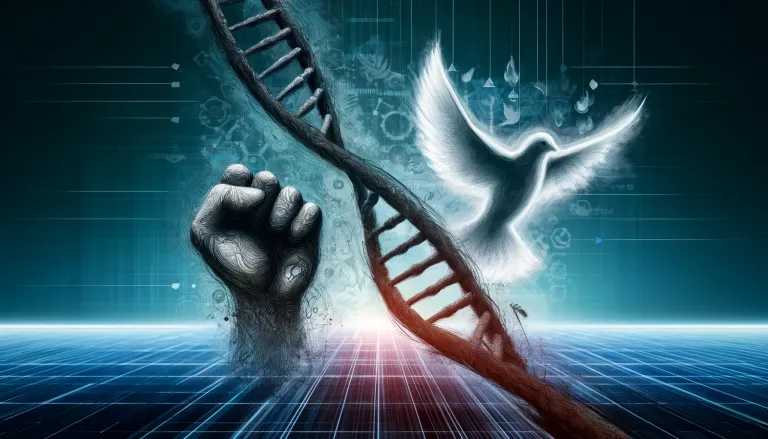
The MAOA gene, also known as "The Warrior Gene," is responsible for producing an enzyme called MAOA. This enzyme helps break down neurotransmitters in the brain, which are chemicals that help brain cells communicate.
The MAOA gene influences neurotransmitters in the brain such as serotonin, dopamine, and norepinephrine, which play a role in regulating mood. Imbalances in serotonin levels can result in symptoms like irritability, anxiety, and aggression. A specific variation of the MAOA gene known as low-activity MAOA has been associated with aggression.
People carrying this variant may experience slower neurotransmitter breakdown, potentially contributing to increased aggressive tendencies. However, just possessing this gene version does not automatically translate to violent behavior; aggression is a complex trait influenced by various factors beyond genetics.
The Argument for the Warrior Gene
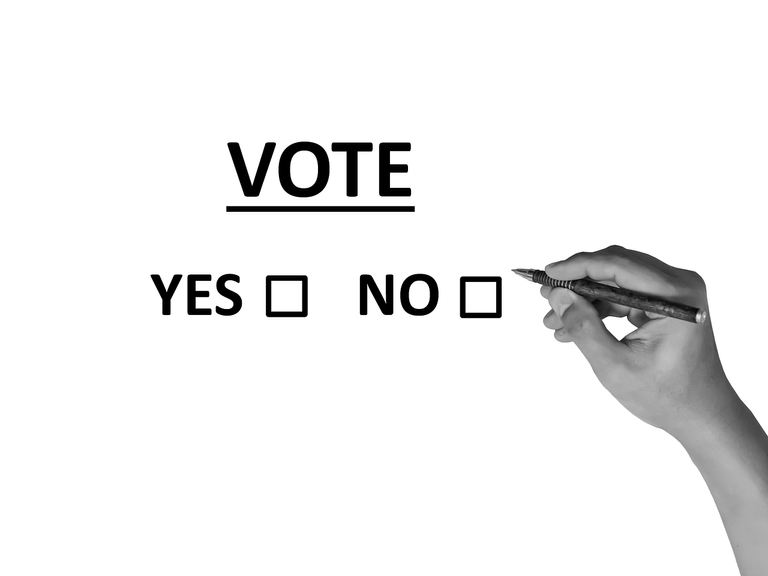
The "Warrior Gene" nickname is controversial, but studies suggest it can influence behavior. The main reason being that it is linked to higher levels of aggression and impulsiveness. Research shows that people with specific versions of this gene may be more likely to react aggressively in certain circumstances. This suggests a possible connection between genetics and behavior, emphasizing the significance of the Warrior Gene in understanding human actions.
Scientific Evidence Supporting the Warrior Gene
Several studies have shown a correlation between the low-activity MAOA variant and aggressive behavior, particularly in males. A pivotal early study by Caspi et al. (2002) found that men with this variant who had also experienced childhood abuse were more likely to exhibit antisocial and violent tendencies.
Biochemical Mechanisms
Studies indicate that the connection between MAOA and aggression is associated with its neurotransmitter processing function. People with the inactive form of MAOA may struggle to efficiently metabolize serotonin. Reduced serotonin levels can result in diminished impulse control and heightened aggression in certain people.
Explaining the Link
Researchers suggest that the "Warrior Gene," or MAOA gene, goes beyond affecting chemicals. It can influence how the brain develops and reacts to different situations. Studies show differences in stress response and emotional regulation regions of the brain, such as the amygdala, hippocampus, anterior cingulate cortex, and orbitofrontal cortex. This new information shows that the gene has a big effect on how the brain works, including how different parts of the brain respond to stress and control emotions.
Real-World Implications of the "Warrior Gene"
The "Warrior Gene" has been introduced in some criminal defense trials. The presence of the low-activity MAOA variant has been used as a potential mitigating factor to try to lessen the severity of a crime. The argument is sometimes presented to suggest a link between the gene and a higher propensity for aggressive behavior, particularly in specific circumstances. However, using genetic information like this in legal contexts and courts raises many ethical dilemmas and questions concerning the extent of individual accountability and the possible misuse of this scientific knowledge in court settings.
The Case Against the Warrior Gene
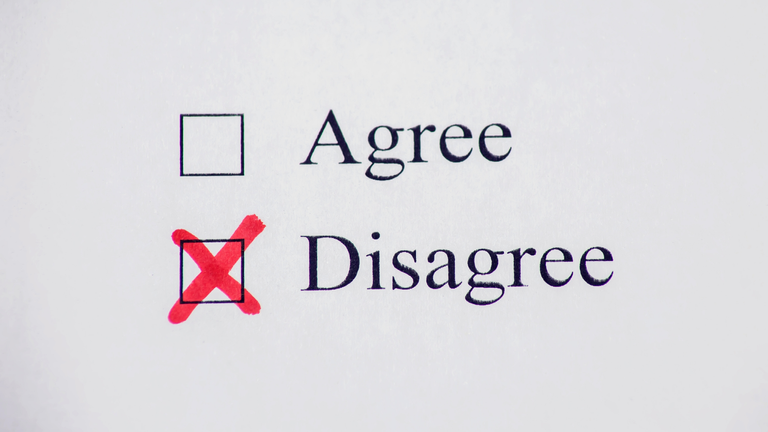
The "Warrior Gene" narrative might be compelling, but it's far from universally accepted. There's a strong body of scientific arguments and evidence that cast doubt on its simplistic link to aggression. While some studies have found correlations between the low-activity MAOA variant and aggression, many others haven't. However, recent research has shed light on people with this gene variant who do not exhibit an increased inclination toward violence.
This discovery challenges traditional assumptions about the relationship between the MAOA variant and aggressive behavior. Additionally, there is a growing amount of data that indicates no substantial connection between the two factors, challenging the validity of labeling this genetic variation as the "Warrior Gene."
One big criticism is that genes don't completely control our behavior. Aggression is complex and influenced by many things like genetics, upbringing, social environment, mental state, and more. Saying aggression is all because of one gene makes it too simple.
The Limitations of Determinism
Focusing solely on one gene like MAOA disregards the interconnection among genetic factors, environmental influences, and behavioral outcomes. Our life experiences, especially during childhood, can significantly influence our behavior. Research demonstrates that a supportive and nurturing environment can mitigate genetic predispositions for aggression, underscoring the intricate relationship between genes and environmental factors in shaping behavior and propensities for aggression.
Potential Biases

Some experts believe that the excessive focus on males in many "Warrior Gene" studies has created potential bias. The overemphasis on males ignores the role of biological sex in the influence of this gene and may oversimplify what is likely a complex interplay between hormones, genes, and behavior.
Nature vs. Nurture: It's Not Either/Or
Nature and nurture both play a role in shaping behavior. It's not just about genes or environment, but a mix of both. Behavior is influenced by a combination of genetic and environmental factors, not just one or the other.
Legal and Ethical Concerns
The "Warrior Gene" concept raises questions in real-life situations, like court cases, and leads to debates about ethics. The MAOA gene is used in some defense strategies in criminal cases. Lawyers argue that having the low-activity variant should be considered when deciding sentences. They say the gene can make their clients more likely to act aggressively, especially when faced with stress or trauma.
Can it Justify Violence?
The question is whether a gene can excuse someone for violent actions. This blurs the line between personal choice and genetic influence. Courts have different reactions to these arguments, with some being more open to genetic evidence than others.
The Dangers of Genetic Determinism
The dangers of genetic determinism are highlighted when using the "Warrior Gene" as an excuse for violent behavior. This belief that our genes control everything can remove personal accountability and justify violence. It also raises worries about genetic profiling and possible discrimination against people with the low-activity MAOA variant.
This information could lead to unfair treatment in various areas, including job opportunities and law enforcement. Furthermore, it questions the reliability of genetic information in predicting violent behavior, considering the many factors influencing our actions.
Social and Psychological Effects
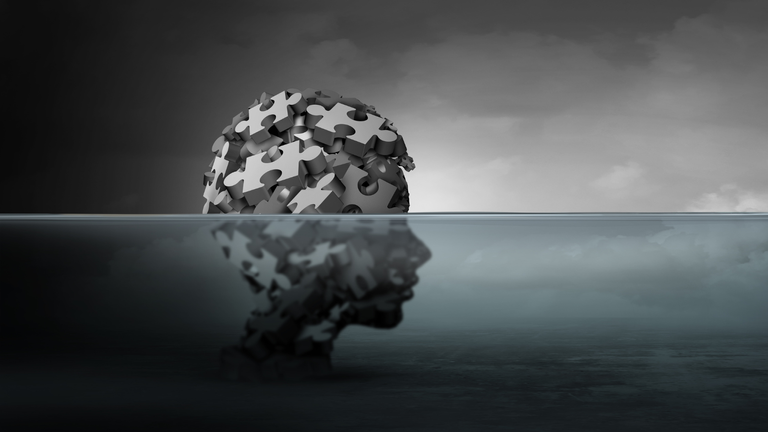
The discussion about the "Warrior Gene" goes beyond labs and courts. It makes us question how we see ourselves and our society. Identifying people with the low-activity MAOA gene early could help them. Understanding a genetic link to aggression could help customize prevention methods like therapy, which can reduce violence. This could break negative cycles and provide better support for those in need.
Labeling Concerns: Associating people with certain genes has a bad past. It can unfairly label individuals with the low-activity MAOA gene as violent or dangerous. These labels can impact how people are treated and restrict their opportunities.
Discrimination Risks: There is a concern that genetic data could be used unfairly, affecting things like jobs, insurance, or law enforcement actions. Just think, you could be denied a job based on your genes, even if you're not aggressive.
Environment: The debate surrounding the "Warrior Gene" encourages us to reconsider nature versus nurture. Regardless of our genes, our environment and social factors have a significant impact on us. Supportive environments, systems, and role models can help mitigate genetic risks. This highlights the importance of looking beyond genes.
Broader Perspectives - Nature vs Nurture
The Warrior Gene debate brings up the age-old question of whether genes or environment influence behavior more. While genes are important, how they interact with surroundings matters too. Factors like upbringing, family, and society affect behavior. Children exposed to violence may become aggressive. Poverty and lack of resources also impact behavior.
Implications for Policy and Public Perception
The discussion of the "Warrior Gene" raises concerns about blaming genes for crimes and mental health issues. Society should focus on addressing deeper causes of violence like inequality and lack of support, instead of solely attributing behavior to genetics. We need to make society fairer and more supportive by providing early interventions for children, addressing poverty and inequality, and improving access to mental health care. By prioritizing support for individuals over genetic factors, we can create a more compassionate and safer world.
Studying How Genes Affect Human Behavior
Exploring how genes like the "Warrior Gene," influence behavior,shows that human conduct is complex and involves many details. Genetics can influence behavior, but we need to consider other factors like society. By addressing societal problems such as inequality and lack of support, we can improve conditions for positive behaviors and mental well-being.
It's important to move away from thinking genes control everything and instead focus on social solutions to build a more caring and understanding society.
Future Directions in Research and Legal Use

Research on how genes influence behavior is always evolving. New technologies such as genome-wide association studies (GWAS) help us analyze things more comprehensively, potentially revealing additional genes that interact with MAOA or alter its impact on us. With a better understanding of these complexities, we may discover more effective ways of assessing risks and preventing problems from emerging.
Evolution of Genetics in the Legal System
As science advances, the way we use genetic evidence in court is expected to evolve. This raises questions about the importance of genetic information in criminal cases and how to balance scientific advancements with concerns about fairness and discrimination. Moving forward, it is crucial for our laws to set clear guidelines to guarantee the fair and responsible use of genetic information.
Rehabilitation and Mitigation Strategies
It's important to remember that having the "Warrior Gene" variant doesn't mean someone will definitely be violent. Instead of labeling people, we should focus on supporting those who might be at higher risk and dealing with things that could trigger aggression.
The Potential for Rehabilitation
Rehabilitation programs that consider genetic factors can be helpful for managing anger and improving coping skills. Cognitive Behavioral Therapy (CBT) can help those with a particular genetic trait in changing how they respond to difficult situations.
The Power of Environment
Improving someone's environment is just as important as changing how they think. Living in a helpful community with good schools and mental health services can reduce risks and promote positive growth. Eliminating things like poverty and discrimination is also key to encouraging peaceful behavior.
Creating a nurturing and safe environment in schools, communities, and homes is important for supporting the health of children and teens. Offering opportunities for connections, mental health care that respects different cultures, and addressing economic and social differences can improve mental health. By creating strong environments and overcoming challenges, people can thrive and have better mental health.
Customized Approaches
Different people may react to things in their own way. To help someone manage aggression, it's important to create a personalized plan that might include therapy, medication, and making changes to their environment. This approach gives the best chance of helping people control any genetic tendencies toward aggressive behavior.
Summary: The Debate over the "Warrior Gene"

The "Warrior Gene" concept is controversial because it's complicated. Some evidence suggests a link between the low-activity MAOA gene and aggression in some people, but it doesn't definitively predict violence. Both sides of the debate have good points, showing that human behavior is complex. It's likely that genetics and environment both play a role. Our genes don't control everything, and we need to consider how our surroundings affect our actions. Blaming aggression only on genetics may overlook personal responsibility and other factors shaping our behavior.
The debate about the "Warrior Gene" shows the need to understand how genetics and behavior interact. It also emphasizes the importance of avoiding simple explanations and supporting people and communities in different ways to promote personal growth and a more inclusive society.
What Do You Think?

Join the conversation about the "Warrior Gene" and genetic determinism. Share your thoughts on the ethics and balance between genes and personal responsibility and whether you believe in a "Warrior Gene" or not in the comments below!
Images - Canva and Dal-E. I have licenses for both.
#science #warriorgene #maoa #genetics #aggression #mentalhealth #kindness #cwh #pob #wellness
Wooooo! I have learnt a lot from here though it's my first time reading nor hearing about this Warrior Gene,"
Thank You